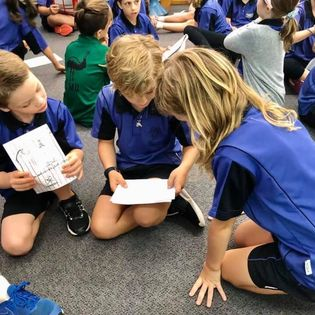Using Strategic Talk To Assist The Developing Writer.
Talk is an integral part of learning, and no less so within the writing workshop. The legendary writing researcher, writer and educator, Donald Graves, regularly encouraged young writers to think aloud and articulate their writing intentions. He wanted young writers to give voice to the intended direction of their, soon to emerge, writing.
In some classrooms though, talk has unintended consequences. Because talk is not used strategically, it becomes an impediment to the flow of writing. For talk to play a supportive role in the writing process, it must be harnessed.
Talk has a great contribution to make during pre-writing. It can contribute to the sparking of potential writing idea. Equally, it can also assist the writer to clarify the direction they wish to take with their writing. It can used to reflect and review writing pieces already under construction.
It is said, the more we articulate our intentions, the more likely we are to actually pursue them. So, providing opportunities for inexperienced writers to engage in this kind of targeted talk supports the gradual emergence of metacognitive writers.
When the writer begins to actually compose, talk can become an impediment to the flow of ideas. At this point engaging in talk can actually distract the writer, halting the flow of words onto the page. Output suffers, talk becomes a social distraction. Writers need to take themselves ‘away’ in order to bring something back that is worthy of sharing. Young writers benefit greatly from knowing this important fact.
To avoid this writing inhibitor, it becomes imperative to teach the young writer strategies that can be called upon to avoid such distractions. Classrooms can be problematic places for young writers. The distractions can be numerous, so teaching the writer to focus their energies on bringing forth their best words becomes a worthy teaching goal to pursue.
Learning to self-regulate and consciously giving undivided attention to the page is critical in building writing volume and writing quality. As educators, providing positive feedback when we witness acts of self-regulation where potential distractions are ignored and writing goals are pursued with admirable commitment, becomes an imperative. We must encourage the behaviours we want young writers to adopt.
One young writer shared her strategy for protecting her writing time from potential distractions. 'I don't say anything to encourage them. I just keep writing and they get the idea that I really just want to write. They give up and start writing too.'
With time and practice, young writers become increasingly more skilled and confident at performing these critical writing actions. Of course, it helps if a teacher can talk about their own self-regulatory behaviours as writers
Talk comes racing back onto the stage at the conclusion of the independent writing phase of the workshop. Regular opportunities to talk and reflect aspects of their writing lives is vitally important to the growth and development of all writers. As teachers, we teach more effectively when we acknowledge and understood this. It allows us to create opportunities to be informed by student reflections. We begin to hear it shining through in the words young writers articulate.
Encouraging young writers to explain their individual writing processes - the journey, and its associated actions that brought about the writing piece, provides a further valuable application of talk.
What did you do to make your writing time valuable today?
How did you achieve your writing goal for this lesson?
Teachers also assist the development of writing among their students when they share and discuss their own writing. This action becomes much more impactful when teacher-writers not only share the writing pieces produced, but also the process they followed in creating that very same writing. When this occurs, the value of sharing rises appreciably.
The importance of sharing individual writing process is increasingly recognized as a critical component within the writing workshop. Young writers need mindful mini lessons that teach into:
· Writing craft
· Writing style
· Writing structure –grammar, punctuation, spelling
· Writing processes-routines, rituals, considered actions
In each of these instances, talk is an essential component.
We, as teachers, learn through listening to the young writers in our care. They become our informants. We, as the most experienced writers in the classroom, must strive to mindfully set up workshop opportunities for meaningful talk to have the desired impact.
With encouragement and practice, young writers begin to share the stories underpinning their individual writing ideas. They reveal the extent of their problem-solving capabilities, and let’s be clear - writing is essentially a problem-solving exercise. They begin to reveal what they think they need in order to succeed as writers; as learners.
As we listen, we begin to understand the inner mechanisms of each learner. These revelations inform the demonstrations we must share. We owe all this to the presence of quality classroom conversations and active listening.
This is the real power of implementing mindful, strategic talk in the writing workshop. Talk used this way within the writing workshop continues to inform best practice in writing. The talk has purpose and the writer prospers.








Comments
Post a Comment